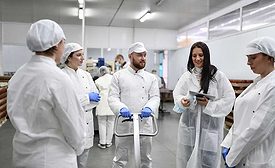Articles by Bob Lijana M.Sc.
Psychosocial risks become important to food safety when they have the potential for causing psychological or physical harm, and when they lead to deficiencies in expected food safety behaviors
Read More
Food Safety Culture and Its Impact on Pest Management
Your sanitation team is critical to the success of your IPM program
October 9, 2023
Rings of Defense: Justifying and Negotiating Food Safety Actions to Regulators
In the stress of an inspection where a noncompliance is found, it is important to consider all avenues for corrective actions
October 9, 2023
Critical Attributes of a Successful Food Safety and Quality Organization: FSQA on the Floor
What does it take to have an extremely effective FSQA technician team on the production floor?
June 12, 2023
Transferring Needed Experience and Skills to the Next Generation
Generational changes, as part of normal turnover in a company, catalyze the need for knowledge transfer—but how can this best be accomplished?
April 10, 2023
The Regulatory Inspection: A Tremendous Opportunity to Build a Relationship
Tips on keeping the peace yet making your point
October 18, 2021
Preventive Maintenance: Another Preventive Control?
Keeping food safe is the ultimate goal
August 17, 2021
Responding to FDA Letters
Tips on how to answer regulatory communications
January 15, 2021
Never miss the latest news and trends driving the food safety industry
eNewsletter | Website | eMagazine
JOIN TODAY!Copyright ©2024. All Rights Reserved BNP Media.
Design, CMS, Hosting & Web Development :: ePublishing







